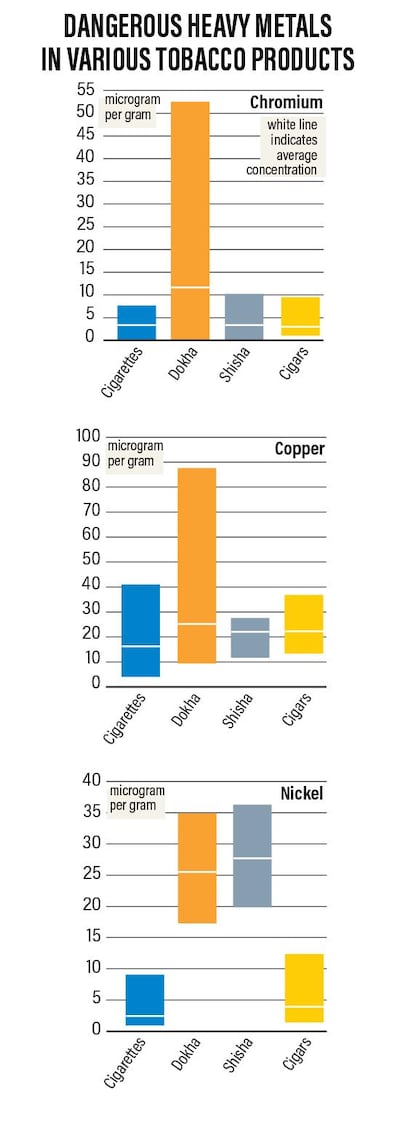Metals that can cause cancer are present in higher levels in medwakh and shisha products than in cigarettes, a new UAE study found.
Scientists in Sharjah and Abu Dhabi found that in comparisons to cigarettes, both medwakh and shisha tobacco contain more nickel, chromium, copper and zinc.
The research follows a study earlier this year reporting much higher levels of nicotine and tar in medwakh than in cigarettes.
Scientists said this put smokers at risk of developing a range of serious medical problems, including lung cancer and coronary artery disease.
“Traditional medwakh and shisha pipes have no filters, so toxic metals can quickly enter the lungs, causing different diseases, such as lung and oral cancers, oral infections and cardiovascular diseases,” said Ayesha Mohammed, a chemistry lecturer at the University of Sharjah and the lead author of the study.
“I would never recommend dokha [medwakh] and shisha smoking because both don't have filters, so trace elements can easily enter the human body compared to cigarettes and cause several cancers.
“Medwakh smoking is a loaded pistol and time will pull the trigger.”
________________
Read more:
Shisha is the biggest smoking threat to health, NYU Abu Dhabi research finds
Shisha is 'much worst for smokers than cigarettes'
________________
Published in Oxford University Press's Journal of Analytical Toxicology, the latest study looked at 13 medwakh tobacco products and three shisha products, analysing their properties to determine metal concentrations.
The levels were then compared with cigarette tobacco to establish which was more likely to pose health risks.
Levels of nickel – a known carcinogen – in medwakh and shisha were found to be particularly high compared to those in cigarettes, while iron levels were found to be roughly the same. Aluminium and manganese levels were discovered to be lower than in cigarettes.
The research was co-authored by Professor Mohamed Al Hajjaj of the University of Sharjah, Abdus Khan of Khalifa University, Abu Dhabi, and Shabber Mohammed and Masrath Mohammed, both of Jazan University, Saudi Arabia.
Earlier this year, Ms Mohammed and several co-researchers released a study that reported much higher levels of nicotine and tar in medwakh than in cigarettes, while those in shisha levels were similar to those in cigarettes.
Other research teams found additional health hazards from shisha, which is often – wrongly – thought to present fewer health risks than cigarettes because the smoke is bubbled through water.
A 2015 study by scientists in Jordan found that shisha exposed smokers to high levels of heavy metals, especially uranium and lead, long-term exposure to both of which can cause cancer.
The bubbling of smoke through water removed only about three per cent of the total quantity of metals, with almost 60 per cent present in the smoke and the rest ending up in the ash residue.
Dr Noordin Wadhvaniya, a respiratory medicine specialist at the Canadian Specialist Hospital in Dubai, said that people who smoked shisha would inhale 26 times the recommended limit of uranium.
“Contrary to the general belief, uranium that is inhaled will most likely damage your kidneys rather than your lungs,” he said.
“However, it does damage the respiratory tract, creates respiratory irritation and accumulation of fluid in the lungs as well.”
Dr Wadhvaniya said people smoked shisha for much longer than they smoked a cigarette, adding that with one puff, shisha smokers inhaled the same amount of smoke as they got from a whole cigarette.
“The average shisha-smoking session lasts an hour and research has shown that in this time you can inhale the same amount of smoke as from more than 100 cigarettes,” said Dr Wadhvaniya.



